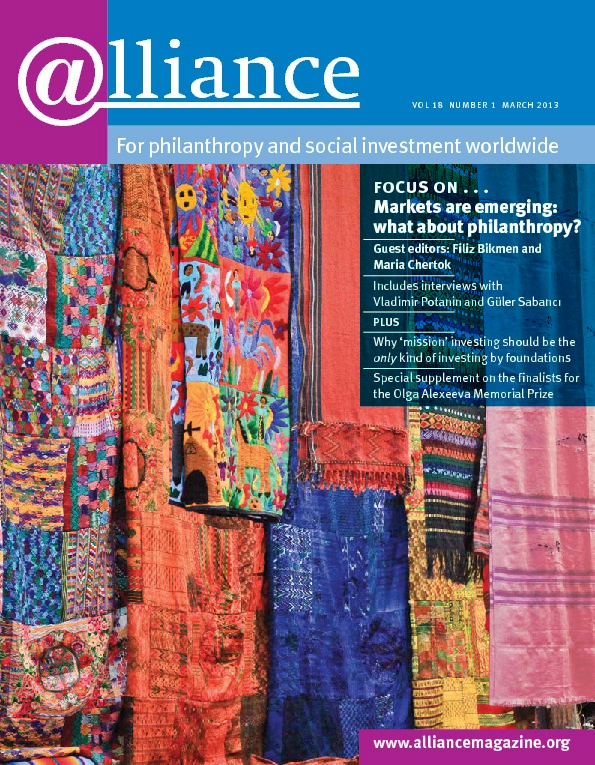The wealth produced by Brazil’s emerging economy has led to what could be called a ‘philanthropy boom’ in the country – first corporate driven, now involving a rapidly growing number of individuals and families. Altogether, a sophisticated industry has developed. However, as the first Brazilian Philanthropy Forum, held in November last year, showed, there are more differences than similarities between philanthropy in Brazil and that in other, more developed countries.
Brazil pioneered the building of an infrastructure for philanthropic activities in South America. In 1995, 25 foundations and institutes created GIFE, which has today around 150 members. Soon after, in 1999, a first local support organization for philanthropy emerged: IDIS, the Institute for the Development of Social Investment. In the 2000s, communication agencies, law firms, accountants, consultancies, NGOs, banks and other wealth management groups started to structure and offer philanthropic services, especially in the richer regions of the country, like São Paulo, Rio and Porto Alegre.
The growing wealth and the birth of a local philanthropy-related industry attracted organizations from developed countries, which began to seek ways to enter this emerging market. The Synergos Institute pioneered the trend in the 1990s. Since 2005, Alliance has published a quarterly newsletter in Portuguese in partnership with GIFE. Today, many other global organizations are running congresses, training programmes, publications and consultancies. WINGS, the Worldwide Initiatives for Grantmaker Support, moved its headquarters to Brazil in 2011.
First Brazilian Philanthropy Forum
A good example of this globalizing movement is the recent partnership between IDIS and the California-based Global Philanthropy Forum. With support from CAF, the Rockefeller Foundation, five Brazilian foundations, the InterAmerican Development Bank and others, they organized the first Brazilian Philanthropy Forum in São Paulo on 30 November, aimed at individuals and families.
In common with most developing countries, family and individual philanthropy in Brazil is still very young here – although growing at an impressive pace. Most of the organizations linked to individuals or families in the room were less than five years old. Corporate philanthropy – or social investment, as it is known – has a longer history, and tends to set the pattern for the new forms of individual and family philanthropy.
In contrast with North American philanthropy, which is mostly about grantmaking to civil society organizations (CSOs), Brazilian social investment tends to take an R&D or ‘social technology’ approach to social change. Most foundations develop methodologies or materials in pilot programmes run by the businesses themselves, and then seek to scale them up through adoption as public policy, paid for by the government. Rather than grantmaking, Brazilian social investment thus aims to build intersectoral alliances between other businesses, government and CSOs, in areas ranging from public education to children’s rights and wealth generation in poor communities.
‘We have to overcome the handicraft type of philanthropic work and gain scale,’ said Viviane Senna, who runs her family’s Instituto Ayrton Senna. ‘The organizations we initially tried to work with could not gain the scale we wanted,’ she remarked, so ‘we have become a knowledge centre, training more than 70,000 people a year’. In similar vein, Sean McKaughan, the new chair of the Panama-based Avina Foundation, remarked: ‘The role of philanthropy is to promote a new social architecture.’
Many shades of grey
Significantly, some forum participants voiced concern about the lack of philanthropy in Brazil geared to strengthening CSOs. In their view, the promotion of a culture of giving, the creation of new tax incentives and the building of trust between foundations and CSOs could lead to a change in this situation.
Unfortunately modern Brazilian philanthropy has always tended to view grantmaking as a less strategic approach to social change. The result is that, although philanthropy is growing, CSOs are facing a very rough funding environment. Brazilian donors are more attracted by the many shades of grey, from a purely public-oriented philanthropic action to the different types of social investment that are taking shape, including some in for-profit enterprises.
A conclusion? Growing wealth does generate philanthropy in practically any place or culture, but the shapes this might take vary a lot.
Fernando Rossetti was secretary general of GIFE from December 2004 to February 2013. Email rossetti@gife.org.br
For more information
http://philanthropyforum.org/regional-events



Comments (0)